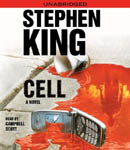
 The Lost World
The Lost World
By Sir Arthur Conan Doyle, performed by a full cast
2 Cassettes, 2 CDs, Approx. 2 hours – [AUDIO DRAMA]
Publisher: Simon and Schuster
Published: 1997
ISBN: 7671401800 (cassettes), 9780671577209 (CDs)
Themes: / Science fiction / Adventure / Exploration / Dinosaurs / Lost Civilizations / Archeology /
Sir Arthur Conan Doyle is known as the creator and writer of that most famous sleuth, Sherlock Homes. Doyle was somewhat resentful of that character’s phenomenal success as it overshadowed all his other writings. His most popular and enduring work that did not feature Sherlock Homes is The Lost World, the story of Professor Challenger and his team of explorers that go to the Amazon jungle and find a primeval plateau inhabited by dinosaurs and ape-men.
Alien Voices was formed in 1996 by Star Trek alumni Leonard Nimoy and John de Lancie with writer-producer Nat Segaloff. These are full cast adaptations with sound effects and music. The Lost World was released as the third Alien Voices title after The Time Machine and Journey to the Center of the Earth. They recorded this release in front of a live audience during the Grand Slam’s Star Trek convention in 1997. The production values are great with terrific sound and a talented cast.
I’ve never read the original work by Doyle, so I won’t speak on the adaptation’s faithfulness. I did look over the text enough to know that the character of Professor Summerlee was switched from male to female for this adaptation. This was a wise move that added a dimension that was not in the original work. Professor Summerlee is played by Roxann Dawson and is strong-willed and independent. Which is as it should be, and Prof. Summerlee stands out as the most interesting character in the cast. Unfortunately, this is one of the few elements that seem fresh and interesting.
My main contention with this adaptation is that it moves too slowly in the beginning. Nearly the first third of the story takes place in London as Professor Challenger gathers his crew for the expedition. This story is an old one. Although as I mentioned I haven’t read the book, I am familiar with the story. We know there are dinosaurs coming, and yet we have to wade through the lengthy backstory. The narrative follows a straight chronological order. A better approach, while still being a faithful adaptation, would be starting the story in the Lost World with some heavy action. The backstory could then be filled with flashbacks in more episodic doses. One of the characters, Malone, is a newspaper reporter that goes on the expedition as a correspondent. The reporter sends dispatches to the newspaper. This narrative device could have been easily utilized to encompass these expositorial flashbacks. So despite a great performance by cast and crew, this versions pacing and lack of surprises makes it a tiring listen.




